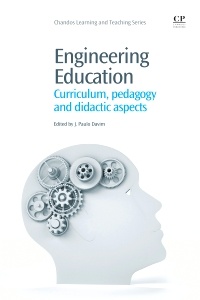Description
Engineering Education
Curriculum, Pedagogy and Didactic Aspects
Chandos Learning and Teaching Series
Coordinator: Davim J. Paulo
Language: English
Publication date: 09-2014
220 p. · 15.5x23.2 cm · Paperback
Out of Print
220 p. · 15.5x23.2 cm · Paperback
Out of Print
Description
/li>Contents
/li>Biography
/li>Comment
/li>
Information about engineering education is highly relevant for improving communication between professors, researchers and students in engineering schools, institutions, laboratories and industry. Technological change is fundamental to the development of education systems. Engineering Education emphasises curriculum development, pedagogy and didactic aspects of engineering education, covering relevant aspects from more classical engineering courses such as mechanical, manufacturing, industrial, chemical, environmental, civil and systems courses, to more contemporary courses including nano-engineering and bioengineering along with information on sustainable development in the context of engineering education.
- List of figures and tables
- Figures
- Tables
- Preface
- About the editor and contributors
- Chapter 1
- Chapter 2
- Chapter 3
- Chapter 4
- Chapter 5
- Chapter 6
- 1: The influences of personality traits on academic performance through imaginative capability: the differences between engineering and science
- Abstract
- Introduction
- Engineering and science
- Engineering imagination and scientific imagination
- The effects of personality traits on imagination
- Method
- Results
- Discussion
- Conclusion
- Acknowledgements
- 2: Developing a personalized and adapted curriculum for engineering education through an ambient intelligence environment
- Abstract
- Introduction
- Ambient intelligence environments
- Brain dominance and thinking styles
- Research model
- Prototype design
- Results, interpretation, and recommendations
- Research model validation
- Conclusion
- 3: Evaluation to support stakeholder-centered design and continuous quality improvement in higher education services
- Abstract
- Introduction
- Evaluation and self-evaluation in the Italian higher education context
- The conceptual approach to evaluating education service performance
- Fuzzy ServQual-based methodology for reliable service evaluation
- Evaluation of Palermo Management Engineering Program education services
- Conclusion
- Appendix
- 4: Software engineering education: from dysfunction to core competency
- Abstract
- Introduction
- Phase I: Addressing the talent shortage problem
- Phase II: improving software engineering core competency
- Conclusion
- Acknowledgment
- 5: The most central occupation requirements for engineering jobs: engineering education implications
- Abstract
- Introduction
- The O*NET database
- Methodological approach and results
- Conclusion
- 6: Energy engineering: an emerging discipline
- Abstract
- Introduction
- The need for energy engineering courses
- The development of undergraduate courses
- The development of postgraduate courses
- Assessment and practical work in academic courses
- Perspectives for energy engineering courses and their graduates
- Conclusion
- Index
J. Paulo Davim is a full professor at the University of Aveiro, Portugal. He is also distinguished as an honorary professor in several universities and colleges in China, India, and Spain. He is the series editor of Elsevier’s Woodhead Publishing Reviews: Mechanical Engineering Series.
- Rigorously covers this timely and relevant area
- A diverse range of subjects examined by international experts
- Written by highly knowledgeable and well-respected experts in the field
© 2024 LAVOISIER S.A.S.
These books may interest you

Manufacturing Engineering Education 121.37 €




